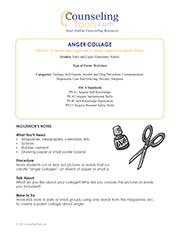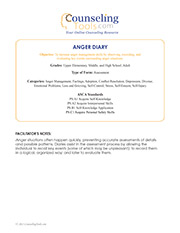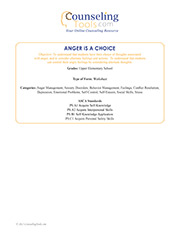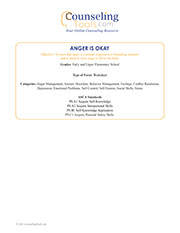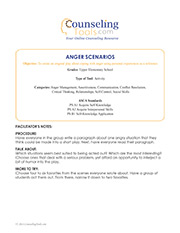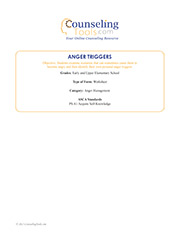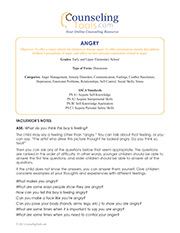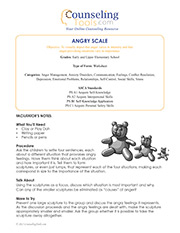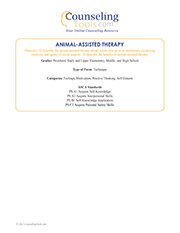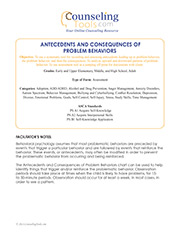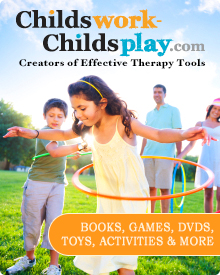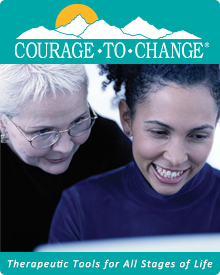-
-
TopicsAdoption, Alcohol and Drug Prevention, Communication, Depression, Divorce, Feelings, Loss & Grieving, Self-Esteem
- Objective
To identify anger triggers and to consider triggers of an opposite feeling.
- Types of ToolsWorksheet
- GradesEarly Elementary School, Upper Elementary School
- ASCA StandardsPS:A1: Acquire Self-Knowledge, PS:A2 Acquire Interpersonal Skills, PS:B1 Self-Knowledge Application, PS:C1 Acquire Personal Safety Skills
- Number of pages2
-
-
-
TopicsAdoption, Anger Management, Conflict Resolution, Depression, Divorce, Emotional Problems, Feelings, Loss & Grieving, Self-Control, Self-Esteem, Self-Injury, Stress
- Objective
To increase anger management skills by observing, recording, and evaluating key events surrounding anger situations.
- Types of ToolsAssessment
- GradesAdult, High School, Middle School, Upper Elementary School
- ASCA StandardsPS:A1: Acquire Self-Knowledge, PS:A2 Acquire Interpersonal Skills, PS:B1 Self-Knowledge Application, PS:C1 Acquire Personal Safety Skills
- Number of pages3
-
-
-
TopicsAnger Management, Anxiety Disorders, Behavior Management, Conflict Resolution, Depression, Emotional Problems, Feelings, Self-Control, Self-Esteem, Social Skills, Stress
- Objective
To understand that students have their choice of thoughts associated with anger, and to consider alternate feelings and actions. To understand that students can control their angry feelings by considering alternate thoughts.
- Types of ToolsWorksheet
- GradesUpper Elementary School
- ASCA StandardsPS:A1: Acquire Self-Knowledge, PS:A2 Acquire Interpersonal Skills, PS:B1 Self-Knowledge Application, PS:C1 Acquire Personal Safety Skills
- Number of pages2
-
-
-
TopicsAnger Management, Anxiety Disorders, Behavior Management, Conflict Resolution, Depression, Emotional Problems, Feelings, Self-Control, Self-Esteem, Social Skills, Stress
- Objective
To learn that anger is a normal response to a frustrating situation and to identify ways anger is felt in the body.
- Types of ToolsWorksheet
- GradesEarly Elementary School, Upper Elementary School
- ASCA StandardsPS:A1: Acquire Self-Knowledge, PS:A2 Acquire Interpersonal Skills, PS:B1 Self-Knowledge Application, PS:C1 Acquire Personal Safety Skills
- Number of pages2
-
-
-
TopicsAnger Management, Assertiveness, Communication, Conflict Resolution, Critical Thinking, Relationships, Self-Control, Social Skills
- Objective
To create an original play about coping with anger using personal experiences as a reference.
- Types of ToolsActivity
- GradesUpper Elementary School
- ASCA StandardsPS:A1: Acquire Self-Knowledge, PS:A2 Acquire Interpersonal Skills, PS:B1 Self-Knowledge Application
- Number of pages2
-
-
-
TopicsAnger Management
- Objective
Students examine scenarios that can sometimes cause them to become angry and then identify their own personal anger triggers.
- Types of ToolsWorksheet
- GradesEarly Elementary School, Upper Elementary School
- ASCA StandardsPS:A1: Acquire Self-Knowledge
- Number of pages2
-
-
-
TopicsAnger Management, Anxiety Disorders, Communication, Conflict Resolution, Depression, Emotional Problems, Feelings, Relationships, Self-Control, Social Skills, Stress
- Objective
- Types of ToolsDiscussion
- GradesEarly Elementary School, Upper Elementary School
- ASCA StandardsPS:A1: Acquire Self-Knowledge, PS:A2 Acquire Interpersonal Skills, PS:B1 Self-Knowledge Application, PS:C1 Acquire Personal Safety Skills
- Number of pages2
-
-
-
TopicsAnger Management, Anxiety Disorders, Communication, Conflict Resolution, Depression, Emotional Problems, Feelings, Relationships, Self-Control, Social Skills, Stress
- Objective
To visually depict that anger varies in intensity and that anger-provoking situations vary in importance.
- Types of ToolsWorksheet
- GradesEarly Elementary School, Upper Elementary School
- ASCA StandardsPS:A1: Acquire Self-Knowledge, PS:A2 Acquire Interpersonal Skills, PS:B1 Self-Knowledge Application, PS:C1 Acquire Personal Safety Skills
- Number of pages2
-
-
-
TopicsFeelings, Motivation, Positive Thinking, Self-Esteem
- Objective
To describe the animal-assisted therapy model where pets serve as reinforcers, socializing catalysts, and agents of social support. To describe the benefits of animal-assisted therapy.
- Types of ToolsTechnique
- GradesEarly Elementary School, High School, Middle School, Preschool, Upper Elementary School
- ASCA StandardsPS:A1: Acquire Self-Knowledge, PS:A2 Acquire Interpersonal Skills, PS:B1 Self-Knowledge Application, PS:C1 Acquire Personal Safety Skills
- Number of pages4
-
-
-
TopicsADD/ADHD, Adoption, Alcohol and Drug Prevention, Anger Management, Anxiety Disorders, Autism Spectrum, Behavior Management, Bullying and Cyberbullying, Conflict Resolution, Depression, Divorce, Emotional Problems, Goals, Self-Control, Self-Injury, Stress, Study Skills, Time Management
- Objective
To use a systematic tool for recording and assessing antecedents leading up to problem behavior, the problem behavior, and then the consequences. To analyze upward and downward patterns of problem behavior. To use assessment tool as a jumping off point for discussions with client.
- Types of ToolsAssessment
- GradesAdult, Early Elementary School, High School, Middle School, Upper Elementary School
- ASCA StandardsPS:A1: Acquire Self-Knowledge, PS:A2 Acquire Interpersonal Skills, PS:B1 Self-Knowledge Application
- Number of pages2
-
- Home
- Topics
- ADD/ADHD
- Adoption
- Alcohol and Drug Prevention
- Anger Management
- Anxiety Disorders
- Asperger's Syndrome
- Assertiveness
- Autism Spectrum
- Behavior Management
- Body Image
- Bullying and Cyberbullying
- Career Exploration
- Character Education
- Classroom Issues
- Cliques
- Communication
- Types of Tools
- Grades
- ASCA Standards
- A:A1 Improve Academic Self-Concept
- A:A2 Acquire Skills for Improving Learning
- A:A3 Achieve School Success
- A:B1 Improve Learning
- A:B2 Plan to Achieve Goals
- A:C1 Relate School to Life Experiences
- C:A1 Develop Career Awareness
- C:A2 Develop Employment Readiness
- C:B1 Acquire Career Information
- C:B2 Identify Career Goals
- C:C1 Acquire Knowledge to Achieve Career Goals
- PS:A1: Acquire Self-Knowledge
- PS:A2 Acquire Interpersonal Skills
- PS:B1 Self-Knowledge Application
- PS:C1 Acquire Personal Safety Skills
- About Us
- Contact Us


 Post Forms here
Post Forms here
